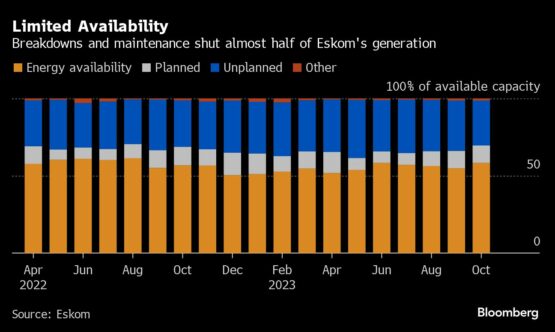A chemical engineer who previously served as Eskom’s head of group capital, Marokane was named as its chief executive officer on Friday after an almost year-long search for a candidate and will take up the post by the end of March next year. His appointment makes him the company’s 15th leader since 2007.
ADVERTISEMENT
CONTINUE READING BELOW
Read: Marokane ‘will hit the ground running’ as Eskom CEO
These are some of the biggest challenges he will face:
1. Instigating a financial turnaround
Eskom reported a R23.9 billion net loss in the current financial year as the outages curtailed its revenue, and it expects to post a similar result in the 12 months through March 2024. While Marokane isn’t expected to restore the company to profit any time soon, he’ll have to demonstrate that progress is being made toward turning it around. The government has agreed to give Eskom a R254 billion bailout over three years, contingent on it instituting cost-saving measures, improving the performance of its plants and other reforms. That leaves little room to manoeuvre.
Read: Eskom doubles losses to R24bn
2. Stemming power cuts
The performance of Eskom’s mainly coal-fired plants has deteriorated over recent years, with their reliability undermined by poor maintenance, and blackouts have reached a record. Marokane may be forced to run some generation units beyond their scheduled retirement dates to avert an even bigger electricity supply gap.
He will also have to decide whether to continue running auxiliary diesel-fired turbines, which are being used around the clock at huge expense to cushion customers against outages. Another challenge will be to ensure that the Koeberg nuclear facility, once regarded as Eskom’s most reliable plant, meets deadlines to complete a refurbishment and license extension.
The government’s plans to buy additional electricity from independent producers to stabilise the grid have faced multiple delays – but that’s largely outside of Eskom’s control.
ADVERTISEMENT
CONTINUE READING BELOW
3. Tackling crime and corruption
A judicial panel found that Eskom’s coffers were systematically looted during former President Jacob Zuma’s scandal-marred rule. The bleed has continued since he left office in 2018, with former CEO Andre de Ruyter estimating that the company loses at least R1 billion a month to corruption and theft. The army was deployed to power stations to help secure their assets, yet criminals still stripped more than R6 billion from the company in its last financial year. Responsibility for addressing the crime scourge and bringing those responsible to book primarily rests with the overstretched law enforcement agencies. That leaves the new CEO with limited scope to act, although he will be expected to step up controls.
Read: Rampant corruption at Eskom drags down SA
4. Reorganising a 100-year-old monopoly
The government announced plans in 2019 to break up Eskom into generation, transmission and distribution units, a move it says will make the various components easier to manage. Marokane will have to push the process through. The transmission unit will be the first to be spun off, but consent from lenders is still needed, and a separate board has to be appointed. The establishment of the business is seen as key to opening up the electricity market more widely to private producers and trading. Eskom has held a near monopoly over electricity provision since its establishment a century ago.
Read: Most of Eskom’s R439bn debt to be allocated to generation unit
© 2023 Bloomberg L.P.

